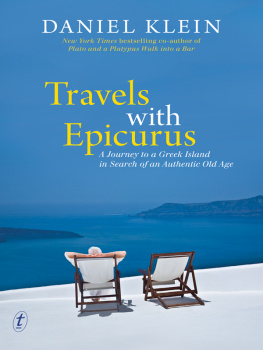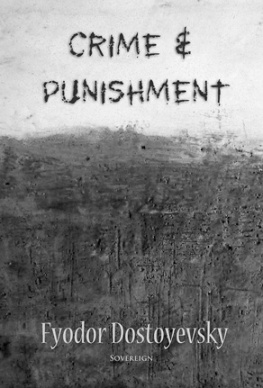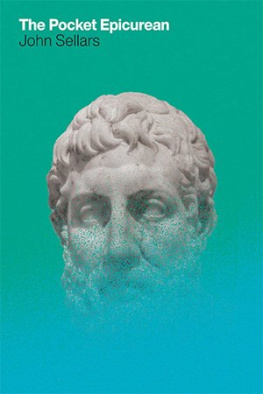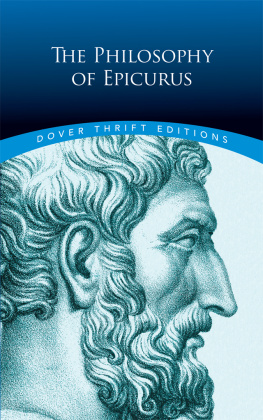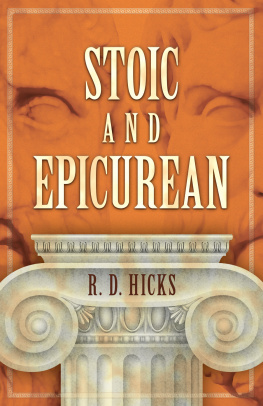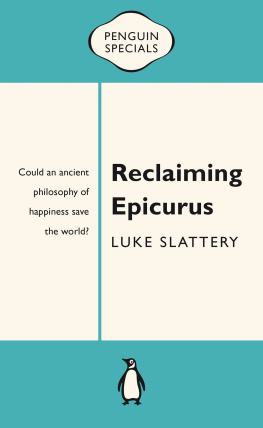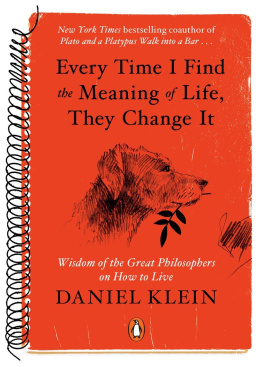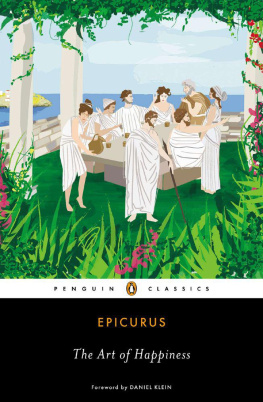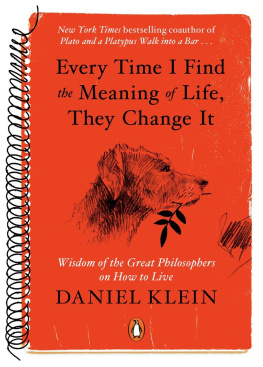
ALSO BY DANIEL KLEIN
(with Thomas Cathcart)
Heidegger and a Hippo Walk through those Pearly Gates
Plato and a Platypus Walk into a Bar
textpublishing.com.au
The Text Publishing Company
Swann House
22 William Street
Melbourne Victoria 3000
Australia
Copyright Daniel Klein, 2012
All rights reserved. Without limiting the rights under copyright above, no part of this publication shall be reproduced, stored in or introduced into a retrieval system, or transmitted in any form or by any means (electronic, mechanical, photocopying, recording or otherwise), without the prior permission of both the copyright owner and the publisher of this book.
First published in the USA by Penguin Books, 2012
Published in Australia by The Text Publishing Company, 2012
Cover design by Imogen Stubbs
Page design by Elke Sigal
Printed and bound in Australia by Griffin Press
Grateful acknowledgment is made for permission to reprint excerpts from the following copyrighted works:
I Get a Kick Out of You (from Anything Goes), words and music by Cole Porter. Copyright 1934 (renewed) WB Music Corp. All rights reserved. Used by permission.
I See It Now, words by William Engvick, music by Alec Wilder. Published by TRO Copyright 1964 (renewed) Ludlow Music, Inc., New York, New York. International copyright secured. Made in U.S.A. All rights reserved including public performance for profit. Used by permission.
Once Upon A Time by Charles Strouse and Lee Adams. Copyright 1962 by Charles Strouse and Lee Adams. Copyright renewed. International copyright secured. All rights reserved. Used by permission of Williamson Music, a division of Rodgers & Hammerstein: An Imagem Company.
This Is All I Ask, words and music by Gordon Jenkins. Copyright 1958 (renewed) Chappell & Co., Inc. (ASCAP) and EMI Robbins Catalog Inc. (ASCAP). All rights reserved. Used by permission.
Why Should Not Old Men Be Mad? from The Collected Works of W. B. Yeats, Volume 1: The Poems, revised, edited by Richard J. Finneran. Copyright 1940 by Georgie Yeats, renewed 1968 by Bertha Georgie Yeats, Michael Butler Yeats, and Anne Yeats. All rights reserved. Reprinted with permission of Scribner, a division of Simon & Schuster, Inc.
National Library of Australia Cataloguing-in-Publication data:
| Author: | Klein, Daniel M. |
| Title: | Travels with Epicurus : journey to a Greek island in search of an authentic old age / by Daniel Klein. |
| ISBN: | 9781922079695 (hbk.) |
| ISBN: | 9781921961892 (ebook) |
| Subjects: | Klein, Daniel MTravelGreece. |
| EpicurusInfluence. |
| AgingAnecdotes. |
| AgingGreece. |
| GreeceDescription and travel. |
Dewey Number: 305.2609495
For Eliana
It is not the young man who should be considered fortunate but the old man who has lived well, because the young man in his prime wanders much by chance, vacillating in his beliefs, while the old man has docked in the harbor, having safeguarded his true happiness.
EPICURUS
Not what we have, but what we enjoy, constitutes our abundance.
EPICURUS
The Table at Dimitris Taverna
ON SEEKING A PHILOSOPHY OF OLD AGE
He is sitting at a wooden table at the far rim of the terrace of Dimitris taverna in the village of Kamini on the Greek island Hydra. Tucked behind his right ear is a sprig of wild lavender that, with considerable effort, he stooped to pick on his way here. From time to timeusually during lulls in conversation with his tablemateshe removes the herb, takes a few sniffs of it, and then returns it to its nesting spot. Leaning against the table to his right is an olive-wood cane topped with a pewter caryatida maiden of Karyai, the ancient Peloponnesian village where the temple was dedicated to the goddess Artemis. He takes this cane with him everywhere he goes, although he does not require it for walking: his gait is slow but steady. The cane is an emblem, a sign of his age. It is also a recognition of his life spent as a man; the ancient Greek word for cane refers to a rod that soldiers used for striking enemies. That his cane handle is a comely and shapely maiden may have some personal significance too; in his younger days he was known as a connoisseur of beautiful women.
I nod to him from my seat under the tavernas awning, where I have been reading a book titled The Art of Happiness, or The Teachings of Epicurus. He nods back with a slight tilt of his white-haired head, a tilt of dignified congeniality, and then returns to conversation with his friends. His name is Tasso and he is seventy-two years old. I have known him for many years now.
Although Tasso looks every year his agehis face and neck are covered with a fine crosshatch of deep lineshere he is still considered a handsome man, a handsome old man. He is said to wear his age on his face, a compliment. When the French philosopher Albert Camus wrote in his novel The Fall, Alas, after a certain age every man is responsible for his face, he too was voicing approval: a mans face tells the truth about him; the face a man acquires is the result of the choices he has made and the experiences that followed from those choices. The islanders say that on a man who has weathered challenging experiences, a finely seasoned face will emerge in old age. It is the face he has earned, and its raw beauty is in the fully lived life it expresses.
I eavesdrop on Tasso and his companions. As is their habit, they sit side by side and speak loudly to one another, so I have no difficulty hearing them. Although my Greek is rudimentary, I can catch the drift of their talk, a conversation that began before I arrived and will continue until the sun begins to drop behind the Peloponnese, just across the sea. It is aimless, cheerful chat, for the most part mundane. They talk about the sunlight, which is unusually hazy today, the new owner of a cheese stall in the port market, their children and grandchildren, the state of political affairs in Athens. Occasionally one tells a story from his pastusually one his companions have heard before. The talk is punctuated by leisurely, comfortable silences as they gaze out at the Peloponnesian straits.

I have returned to this Greek island on a personal quest: I am an old man myself nowseventy-threeand I want to figure out the most satisfying way to live this stage of my life. Having spent, over the years, several extended periods in Greece, I believe I may find some clues in the way old people live here. The old folks of Hydra have always struck me as uncommonly content with their stage in life.
I have also toted across the Atlantic a lean library of philosophy booksmost by ancient Greek thinkers, some by twentieth-century existentialists, plus an assortment of other favoritesbecause I think I may find some clues in these too. Since I was a college student, over fifty years ago, I have had an enduring interest in what the great philosophers have to say about how to live a valuable and gratifying life. I remember that some of these thinkers had intriguing ideas about how to live a fulfilling old age, although it was not a subject that particularly attracted me when I still had youthful ambitions (not to mention boundless energy and hair). The prospect of reading the ancient Greek philosophers while surrounded by the rocky, sunlit landscape where their ideas first flourished feels just right to me.

